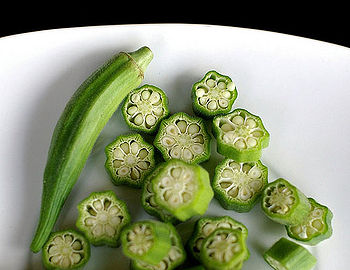Okra
Other Names : Abelmoschus esculentus, lady's fingers, Gumbo.
is a flowering plant in the mallow family. The geographical origin of okra is disputed, with supporters of South Asian, Ethiopian and West African origins. The plant is cultivated in tropical, subtropical and warm temperate regions around the world. Okra is a flowering plant with edible pods that is related to hibiscus and cotton.
Special Precautions of Okra
The benefits of Okra are
It is one of the best plants for healthy digestion; it cleanses the bowels by soothing intestinal membranes with its vegetable mucin, the substance that gives okra its sticky texture. It also contains soluble and insoluble fiber, which are essential for digestive health. Okra powder is a great source of vitamins A and B, calcium, potassium and folic acid.
- Rich in vitamins and minerals
- Promotes healthy digestion and can help keep bowels clean and performing their best
- Contains Folic Acid, which is beneficial for healthy heart and circulation.
- Effective against Gluten Sensitivity.
- Breast Cancer : In 2014, researchers found that a new type of lectin killed 72% of breast cancer cells in vitro and inhibited the growth of breast cancer cells by 63%.
- Melanoma : another component of Okra, called peptin, which is found under the skin of the pods—is made up of never—before—seen compounds that researchers theorize may help inhibit highly metastatic mouse melanoma cells. This peptin suppressed cancer cell proliferation by 75% just 48 hours after mice were treated. And it increased cancer cell destruction 23-fold.
- Prostate Cancer : A study made up of 3,800 men and published in Cancer Epidemiology, Biomarkers and Prevention showed that over the course of 10 years the Southern diet—consisting of okra, grits, cornbread, beans, rice, and sweet potatoes—reduced the risk of prostate cancer by as much as 40%.
- In 2012, researchers discovered a new type of lectin in okra that possessed anti-inflammatory and pain-relieving properties.
